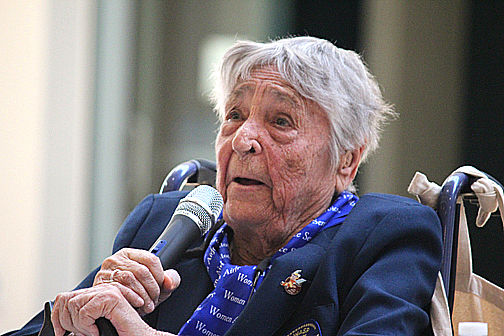One of Flintridge Sacred Heart Academy’s oldest alumna at 95, Beverly “Bev” Beesemyer visited the La Ca√±ada Flintridge campus March 12 to speak to students about her experiences as part of the Women Air Service Pilots (WASP) organization during WWII.
Beesemyer, a member of FSHA’s class of ’37, recalled her training in Sweetwater, Texas, close encounters while flying gunnery targets, and the camaraderie of the female pilots in the WASP program, which ran from 1943 until the end of 1944, created so women pilots could free male pilots for military service.
Twice her plane caught on fire while in the air, resulting in emergency landings. Of those harrowing adventures, Beesemyer said, “Even with fire engines racing down the fields as I touched down, I thought it was all kind of fun!”
Though they lived in barracks and received similar military training, the WASPs were considered civilians and they often struggled to finance basic necessities, like uniforms.
As civilians, the women also had to handle tragedies on their own. Beesemyer recounted how, when a WASP was killed while serving, all the women pooled their money together to be able to send the body back to family members.
Denied official recognition for decades, the WASP organization was granted full military status in 1977. In 2010, the WASPs received the Congressional Gold Medal, one of the highest civilian awards in the United States. Beesemyer was on hand to receive the award presented in Congress’ Rotunda.
“I cried. I really did,” said Beesemyer. “Thousands of people were there. It was very sentimental.”
Beesemyer kept her pilot’s license until the ’80s and confesses to “rubbernecking” anytime a big plane flies by. “It’s impossible to tell you what it’s like flying in the clouds,” she said.
But, her overall message to the students at FSHA was about taking risks. “I was just a little girl with an opportunity,” Beesemyer told the audience. “Be yourself, and do what you want to do, and don’t ever hesitate going gung-ho for what you desire.”

